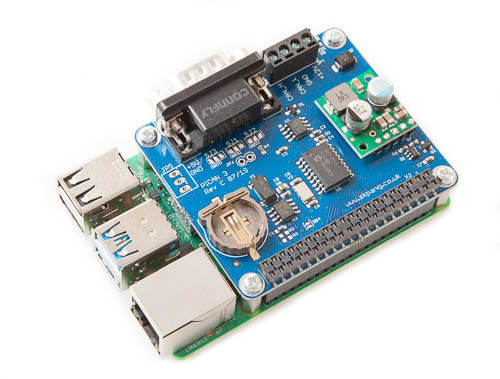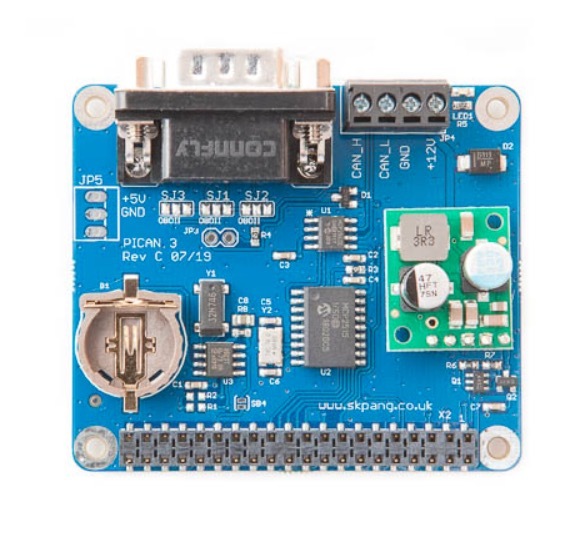Copperhill Technologies has recently announced the release of its PiCAN3 CAN-Bus Board for the Raspberry Pi 4. The PiCAN3 adds Controller Area Network capabilities plus a real-time clock to the new Raspberry Pi SBC.

The Controller Area Network (CAN Bus) is a robust and common industrial communication bus used mostly in the automotive industry. CAN supports long travel distance, medium communication speed, and quite reliable. One of the most significant advantage with CAN-BUS is that it connects any number of ECUs (or microcontrollers) in your car through the two-wire bus, CAN High and CAN Low, reducing the weight of wires that could be gained by using point-to-point communication between ECUs.
CAN bus is one of five protocols used in the on-board diagnostics (c)-II vehicle diagnostics standard. Although it is popular in the automotive industry, the Raspberry Pi doesn’t provide an off the shelf support for working with CAN-BUS. Users interested in trying out CAN will have to result to using HATs like the NoCAN IoT, or the uCAN CAN board which was designed based on Orange Pi Zero Board.
Copperhill Technologies involvement in the CAN-BUS domain is not the first time. They have released several CAN add-ons, especially those targeted for the Arduinos. For the Raspberry Pi, they already have the PiCAN and PiCAN2.
The PiCAN3 is the latest CAN-BUS offering from the Copperhill Technologies which was specially built for the Raspberry Pi 4. The PiCAN3 Board comes with 3A Switch Mode Power Supply (SMPS) and an onboard real-time clock (RTC) through a built-in PCF8523 CMOS RTC and calendar chip.

CAN capability on the PiCAN3 is possible with the Microchip MCP2515 CAN controller and an MCP2551 CAN transceiver. The CAN Bus and power supply connections are made via the onboard DB9 or the 3-way screw terminal.
The Switch Mode Power Supply (SMPS) allows connecting an input voltage range of 6 VDC to 20 VDC suitable for industrial and automotive applications. The SMPS also assist in powering the Raspberry Pi and the PICAN3 eliminating the need for a Micro-USB power supply.
Features
- CAN 2.0B at 1 Mb/s
- High-speed SPI Interface (10 MHz)
- Standard and extended data and remote frames
- CAN Bus connection via standard 9-way sub-D connector or screw terminal
- Compatible with OBDII cable
- Solder bridge to set the different configuration for DB9 connector
- Onboard 120 Ohm termination resistor
- Serial LCD ready
- LED indicator
- Four fixing holes, comply with Pi Hat standard
- SocketCAN driver appears as can0 to application
- Interrupt RX on GPIO25
- 5VDC @ 3A SMPS to power Raspberry Pi and accessories from DB9 or screw terminal
- Reverse polarity protection
- High-efficiency switch mode design
- 6 VDC to 20 VDC input range
- RTC with battery backup (battery not included, requires CR1225)
The PiCAN3 design seems to be open-source because the design schematics are available for download on the product page. The PiCAN3 is easy to install, it leverages on the easy-to-install SocketCAN driver, and programming can be accomplished in C or Python.
For the real-time clock, alarm and timer functions are accessible with the opportunity to produce a wake-up signal on an interrupt pin.
The PiCAN3 Bus Board is available for pre-order for $65.95, and the board is expected to be fully available from Sep 23rd, 2019.
More information about the board is available on the product page.
Via LinuxGizmos

I enjoy writing about the latest news in the areas of embedded systems with a special focus on AI on edge, fog computing, and IoT. When not writing, I am working on some cool embedded projects or data science projects. Got a tip, freebies, launch, idea, gig, bear, hackathon (I love those), or leak? Contact me.
Support CNX Software! Donate via cryptocurrencies, become a Patron on Patreon, or purchase goods on Amazon or Aliexpress




